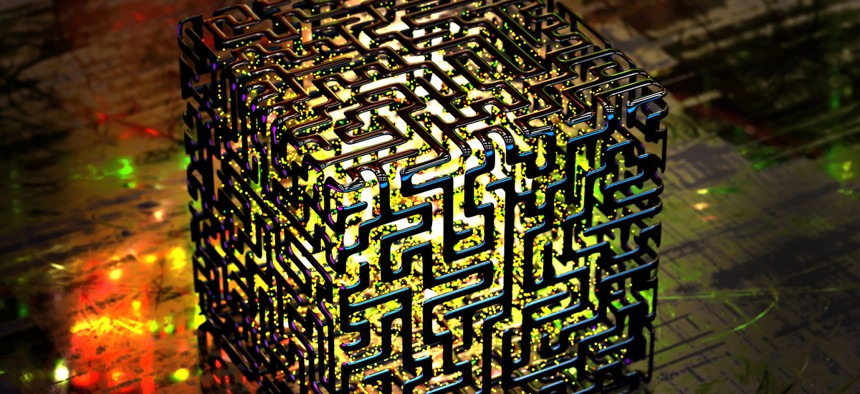Future Quantum Computers Already Threatening Today’s Data

plotplot/Shutterstock.com
Large-scale quantum computing could be just five years away.
It may seem like the plot of a new Terminator movie, but quantum computers from the future are threatening government data today. But before you accuse me of wearing my tinfoil hat a little too tightly, consider the fact that the future we are talking about may not be that far off. IBM perfected a 50-qbit quantum computer last year and recently opened up its older 20-qbit model for anyone to play with on the web. They estimate that large-scale quantum computers are a mere five years, or less, away.
If you need a quick refresher course on quantum computing, feel free to read my explainer column from a few years ago as it has all the details, including a video from the National Science Foundation talking about quantum technology. Suffice to say, quantum computers look at all the possibilities for a bit of information at the same time, as opposed to traditional computers, which mush everything into a long series of ones or zeros. With a quantum computer, each bit of data is a one and a zero, and everything in between, all at the same time.
When scientists originally started working with quantum machines, there was a debate about whether they were even real. They do seem pretty farfetched, seemingly breaking the laws of physics to operate. And they must perform their calculations literally in the dark, in soundproof black boxes, in a vacuum, and as close to absolute zero as possible. They almost seem more like alchemy than hard science. But they do work, just not yet at larger scales. However, governments and private companies are all collaborating and competing to create the first true, large-scale quantum computer.
And that brings us to the very real problem of data protection that even now is under threat. The government, through the National Institute of Standards and Technology, knows that one day soon quantum computers will be able to crack the strongest public-key cryptosystems currently in use, for example, for securing web service. And symmetric key cryptosystems such as AES will require longer key lengths to remain secure.
NIST is actively searching for a way to create a new type of encryption that a quantum computer couldn’t break. The idea is to transition all currently encrypted files to the new protection before a sufficiently powerful quantum machine can be completed. But if that is our strategy, we have already lost.
Hackers, with many of them supported by nation-states, are actively skimming and stealing encrypted data right now, even though it would take them thousands of years to crack it with current technology. But they aren’t even trying to go that route. Instead, they’re storing data in anticipation that a quantum machine in the near future can crack it wide open, long before anyone can perfect quantum-resistant encryption. Their strategy is to steal data now, and then read it later. It’s a good plan for whichever nation or group becomes the leader in quantum computing.
The other danger is that most of the quantum-resistant computing methods being developed are based on quantum computing itself, with the idea that it takes fire to fight fire, or a quantum machine to create a post-quantum cryptography solution. Given the level of funding for quantum computing within the United States compared with other countries, it’s a race that we will have trouble winning.
Take China for example. While their government budget is a closely guarded secret, we do know that they constructed a research laboratory to specifically study and develop quantum computing at a cost of $10 billion. That compares to the $899 million that the Defense Department allocated for all computer science research, quantum and otherwise, in their most recent budget.
And China is already seeing much success. They created the only quantum-protected landline connecting Beijing and Shanghai, which provides completely unbreakable encryption between those two cities. They also have a satellite called Micius which can use quantum computing to encrypt any communications routed through it, which was demonstrated using a quantum-protected Skype call.
Other countries are also seeing quantum success. Russia has its own government-funded Quantum Computing Center, and recently announced a breakthrough with a quantum computer that is able to do basic calculations without a lot of special programming, meaning they may soon be able to use software designed for more traditional machines but run it at quantum speeds.
Those are just a few examples, but they show areas where protections are being developed to thwart future quantum code-breaking efforts. America may not be very far behind, with companies like Microsoft, Intel, Google and IBM rapidly accelerating their quantum research. But quantum protection is needed today for government files. It’s the only way to protect them from the quantum computers of the future, whose agents may already be collecting the valuable data they will easily crack.
John Breeden II is an award-winning journalist and reviewer with over 20 years of experience covering technology. He is the CEO of the Tech Writers Bureau, a group that creates technological thought leadership content for organizations of all sizes. Twitter: @LabGuys






